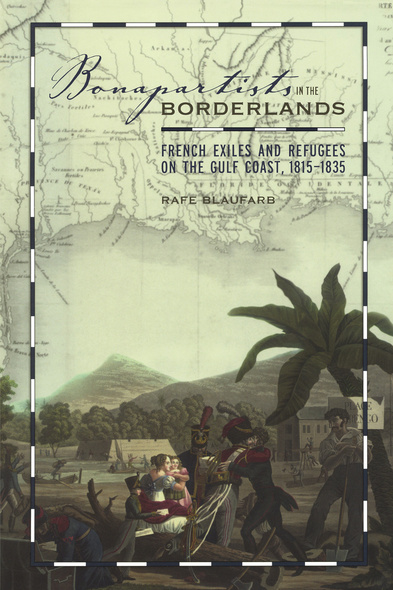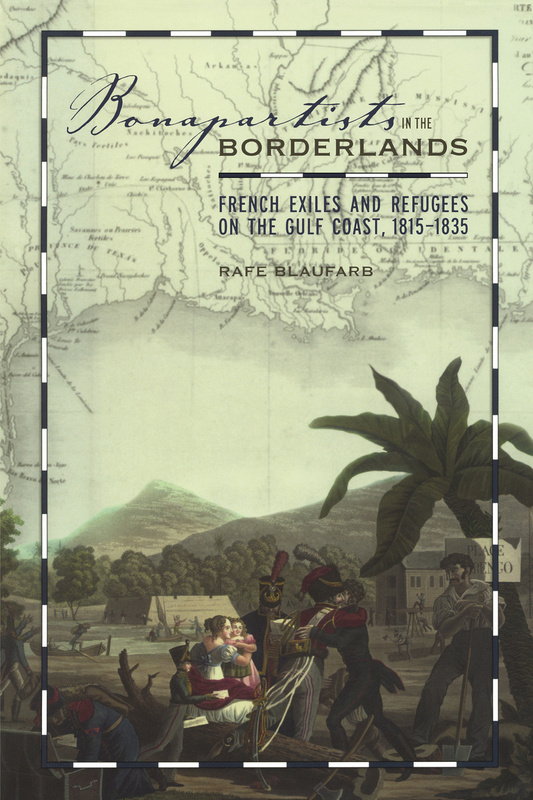
324 pages, 6 x 9
15 B&W Figures - 5 Maps - 11 Tables
Paperback
Release Date:15 Nov 2016
ISBN:9780817358808
Bonapartists in the Borderlands
French Exiles and Refugees on the Gulf Coast, 1815-1835
University of Alabama Press
Provides an important revision of the causes of the failure of France's Vine and Olive Colony in Alabama, placing it within the context of America's westward expansion
Bonapartists in the Borderlands debunks the standard account of the Vine and Olive Colony, which stresses the failure of aristocratic, luxury-loving French to tame the wilderness. Rafe Blaufarb recounts how Napoleonic exiles and French refugees from Europe and the Caribbean joined forces with Latin American insurgents, Gulf pirates, and international adventurers to seek their fortune in the Gulf borderlands. The US Congress welcomed the French and granted them a capacious tract of rich Black Belt land near Demopolis, Alabama, on the condition that they would establish a Mediterranean-style Vine and Olive colony.
Blaufard shows that it was not a lack of grit that caused the enterprise to fail. Rather, the Napoleonic officers involved in the colony sold their land shares to speculators to finance an even more perilous adventure—invading the Texas borderlands contested by Spain and the US. Their departure left the Vine and Olive colony in the hands of French refugees from the Haitian slave revolt. They soon abandoned vine cultivation and fused with the neighboring communities of Anglo-American slaveholding cotton planters and speculators.
Rafe Blaufarb examines the underlying motivations and aims that inspired this endeavor and details the nitty-gritty politics, economics, and backroom bargaining that resulted in the settlement. He employs a wide variety of local, national, and international resources: from documents held by the Alabama State Archives, Marengo County court records, and French-language newspapers published in America to material from the War Ministry Archives at Vincennes, the Diplomatic Archives at the Quai d’Orasy, and the French National Archives.
Bonapartists in the Borderlands debunks the standard account of the Vine and Olive Colony, which stresses the failure of aristocratic, luxury-loving French to tame the wilderness. Rafe Blaufarb recounts how Napoleonic exiles and French refugees from Europe and the Caribbean joined forces with Latin American insurgents, Gulf pirates, and international adventurers to seek their fortune in the Gulf borderlands. The US Congress welcomed the French and granted them a capacious tract of rich Black Belt land near Demopolis, Alabama, on the condition that they would establish a Mediterranean-style Vine and Olive colony.
Blaufard shows that it was not a lack of grit that caused the enterprise to fail. Rather, the Napoleonic officers involved in the colony sold their land shares to speculators to finance an even more perilous adventure—invading the Texas borderlands contested by Spain and the US. Their departure left the Vine and Olive colony in the hands of French refugees from the Haitian slave revolt. They soon abandoned vine cultivation and fused with the neighboring communities of Anglo-American slaveholding cotton planters and speculators.
Rafe Blaufarb examines the underlying motivations and aims that inspired this endeavor and details the nitty-gritty politics, economics, and backroom bargaining that resulted in the settlement. He employs a wide variety of local, national, and international resources: from documents held by the Alabama State Archives, Marengo County court records, and French-language newspapers published in America to material from the War Ministry Archives at Vincennes, the Diplomatic Archives at the Quai d’Orasy, and the French National Archives.
In March 1817, the US Congress granted 144 square miles of land near the confluence of the Tombigbee and Black Warrior rivers to the Society for the Cultivation of the Vine and Olive, a group of French refugees who claimed that they wanted to practice viticulture in the region. By focusing on the local story of the Vine and Olive experience, Blaufarb illustrates how this venture became part of the much larger national and transatlantic geopolitical upheaval that defined the gulf borderlands. Recommended.’
—CHOICE
‘This meticulously researched and well-written volume gives additional dimension and historical understanding to the complexities of the antebellum South.’
—The Journal of Southern History
[. . .} Blaufarb’s book skillfully distinguishes groups of French migrants made visi ble by conventions post-Reconstructino mythmaking from other, more invisible groups of francophone immigrants who resided in the United States during the first quarter of the nineteenth century. The range of interpretive horizons opened by this ambitiously conceived monograph is stunning.’
—American Historical Review
This is an ambitious, very well written, extensively researched book. . . .The author situates it at the intersection of public land policy, western expansionism, and the Latin American independence movement.’
—Michael A. Morrison, author of Slavery and the American West
‘A well researched and intriguing book. . . . Professor Blaufarb focuses the reader’s attention to the flight of Bonapartists from France and combines the development of the Vine and Olive Colony with the struggle between Spain and the United States for control of the borderlands of the Southeast and the revolt of Spain’s colonies in Latin and South America.’
—Joe B. Wilkins, University of West Alabama
Rafe Blaufarb is Associate Professor of History at Florida State University. He is author of The French Army, 1750–1820: Careers, Talent, Merit.
Preface
Introduction
1. The New Atlantic France
2. The Society for the Cultivation of the Vine and Olive
3. Double and Treble Treachery
4. Ultra-Quixotism: The Bonapartist Invasion of Texas
5. The Vine and Olive Colony
6. The Fate of Vine and Olive
Appendix: The Grantees and Their Allotments
Notes
Bibliography
Index
Illustrations follow page 147.






